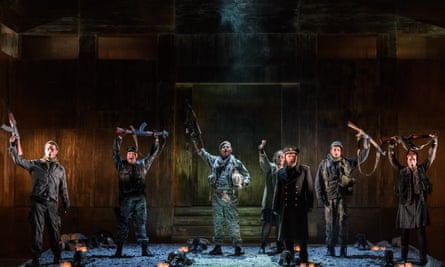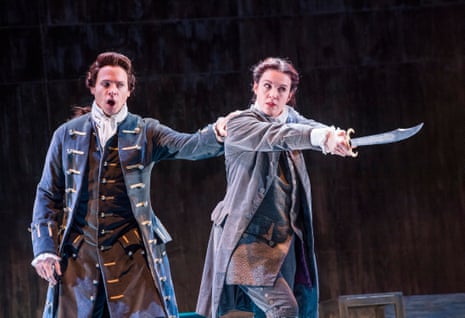English Touring Opera’s autumn season centres on two great baroque works, Handel’s Giulio Cesare and Rameau’s Dardanus. They’re poles apart in style: Rameau’s tragédie lyrique – tense, declamatory and reined in – is almost antithetical to Handel’s expansive, bravura take on Roman history. Yet they’re also comparable in aim and subject; each deals with the relationship between sex and war, the private agendas that dictate political expediency and the phenomenon of love across enemy lines.
Giulio Cesare comes with a catch. Director James Conway has opted to stage the complete opera, but aware that its length – more than four hours uncut – can strain audiences’ attention spans, he has presented it in two parts, which you can see either on different nights, or as matinee and evening performances on the same day. Awkwardly, he has also decided to open Part Two with a repeat of the final scenes of Part One, some 45 minutes of music. The aim is presumably to allow us to refamiliarise ourselves with preceding events, but the overlap creates a lengthy hiatus precisely at a point where we want the narrative to press forward.
Mindful that the work was written during a time when British imperial ambition was tempered by contention over the Hanoverian Protestant Succession and the Jacobite cause, Conway locates it firmly in 1724, the year of the premiere. The Romans have become Protestants, the Egyptians Catholics, and the whole thing is an insidiously decorous exposé of corruption and hypocrisy on both sides. Soraya Mafi’s Cleopatra plots mischief under the watchful eye of her confessor Nireno (Thomas Scott-Cowell), before attempting to delude Christopher Ainslie’s befuddled, sensualist Cesare into thinking her a goddess by dressing as the Virgin Mary. Kitty Whately’s traumatised Sesto dithers in Hamlet-like trepidation about whether or not to kill Benjamin Williamson’s odious Tolomeo in revenge for his father’s murder. At the end, Catherine Carby’s implacably principled Cornelia clearly has Cesare’s assassination in mind, and we realise, with horror, that Sesto is to be the instrument with which she intends to carry it out.
It is wonderfully sung. Ainslie, on tremendous form, spins out Handel’s lines with exceptional beauty, and his coloratura is immaculate and thrilling. Mafi, her tone silvery yet sensuous, is a comparably outstanding Cleopatra; Se Pietà is particularly exquisite – one of the advantages of the overlapping material is that we get to hear her sing it twice. Williamson’s Tolomeo is all waspish spite, while Whately admirably conveys the vulnerability that lurks behind Sesto’s bravado. Jonathan Peter Kenny conducts the Old Street Band with great elegance.

Comparatively unfamiliar to UK audiences, Dardanus, meanwhile, is a remarkable work, shot through with the grace and magic we primarily associate with Shakespeare’s late plays. The Prospero-like sorcerer Isménor unravels the threads of destiny that conspire against the marriage of Dardanus with Iphise, the daughter of Teucer, Dardanus’s sworn enemy in war. The couple’s happiness must come, however, at the price of the life of Anténor, who loves Iphise and is her father’s preferred suitor. Rameau’s tentative optimism is balanced by deep, contained sadness – this is music that gets quietly under your skin.
Douglas Rintoul’s production uses the same basic set (designed by Cordelia Chisholm) as Giulio Cesare, but its gilded corridors of power have now become a shuttered mausoleum in a modern-day war zone, where the ashes of countless fallen are strewn on the floor and relatives assemble to collect mementoes of the dead. The imagery initially seems heavy, but Rintoul works with, rather than against, the score. We’re soon engrossed in the opera’s world as Frederick Long’s Isménor conjures up gods and spirits, Grant Doyle’s Teucer frets and fumes over his daughter, and Dardanus and Iphise – Anthony Gregory and Galina Averina – move slowly towards expressing their long-concealed feelings for each other. The closing scenes, in which the machinery of war is finally dismantled and people begin to smile again, are profoundly touching.
Gregory and Averina are ideal as the lovers: Gregory’s poetic way with both text and line is particularly beguiling. Long makes an authoritative Isménor. Doyle blustered a bit on opening night, his dark baritone taking a while to settle. Anténor, however, is the character around whom the work pivots, emotionally and morally. Timothy Nelson plays him superbly as a man whose innate nobility is threatened by the jealous fires that lurk within. The Old Street Band don’t sound quite as much at ease with Rameau’s idiom as they do with Handel’s, although they play with deeply felt intensity for Jonathan Williams.
- Giulio Cesare is at New Theatre Royal, Portsmouth, on 13-14 October. Box office: 023-9264 9000, then tours until 24 November. Dardanus is at Sheldonian theatre, Oxford, on 12 October, then tours until 7 November.

Comments (…)
Sign in or create your Guardian account to join the discussion